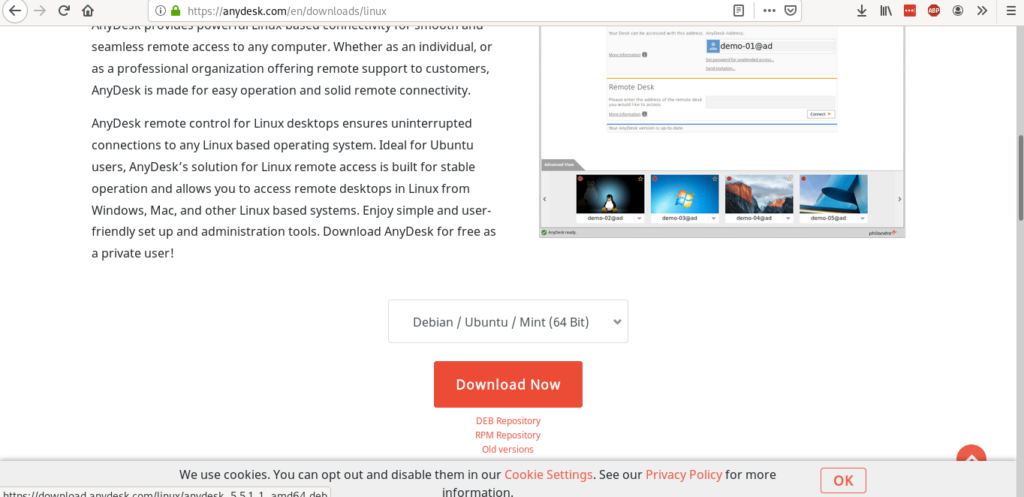AnyDesk is not only compatible with Windows 10, but many other operating systems and their various versions, including iOS, macOS, Linux and Android. What is more, AnyDesk facilitates managing your remote desktop contacts and connections and administrating all settings and configurations in Windows, so you can focus on your projects rather than. AnyDesk is also mainly compatible with Windows 10, Windows 8, Windows 7, and Windows XP operating systems, as well as Linux and macOS. There will be systems that it is not compatible with which might limit its use on a broad scale. Use a disabled listening port in your custom client for standard users without the ability to install AnyDesk. Discovery AnyDesk's Discovery Feature uses a free port in the range of 3 and the IP 239.255.102.18 as default values for multicasting. AnyDesk is genuine application that provides remote System control functionality. It provides remote access to personal computers running the host application which can be installed on Windows, MacOS, Linux and FreeBSD. This application allows you to access said computer both from personal computers and from iOS and Andriod moble devices.
Access sleeping or shutdown Windows, macOS, and Linux devices using Wake-On-LAN.
Requirements
- At least one more AnyDesk device in the local network must be online.
- Wake-On-LAN is enabled in the AnyDesk settings.
Anydesk 10.6.8
Wake-On-LAN Settings
- Disabled: Deactivates Wake-On-LAN in AnyDesk.
- Enabled: Activated by default. Using this option, AnyDesk will automatically ping random AnyDesk clients on the same direct local area network as the device to be woken up and request them to send a wake-up packet to the target device.
- Enabled, but wake your device using the following desks only: AnyDesk ID(s) from devices in the local network can be set up here. The device can only be woken up, as long as one of the devices in the list is online.
Wake from Sleep Mode
AnyDesk wakes devices set to Sleep Mode, given that at least one device running AnyDesk is available in the local network of the incoming client.


Anydesk For Windows 10
Wake from Shutdown
Wake on LAN for devices that are shutdown:

- Shutdown (S5 Power State, default for Windows 7)
- Hybrid shutdown (Default for Win 8, 8.1, 10)
is available when the network-adapter is configured for Wake-On-LAN in the BIOS/UEFI.
Disclaimer: All changes to your system are made without guarantee and at your own risk.

- Enter BIOS Settings at the startup of your PC (usually by pressing Del or F1)
- Find Power Management menu and Wake-On-LAN option there
- Enable Wake-On-LAN
- Enable Wake-On-LAN in your OS:
- For Windows 7/10:
- Open Start menu
- Search for “Device Manager”
- Expand the “Network Adapters” section
- Right mouse click on the network card and go to Properties
- Select Tab 'Advanced'
- Scroll down in the list to find “Wake on Magic Packet”
- Change the value to “Enabled”
- Click the Power Management tab
- Set “Allow this device to wake the computer” and “Only allow a magic packet to wake the computer” to enabled
- Click OK
- Deactivate fast startup
- Open Settings
- System
- Power & Sleep
- Additional power settings
- Choose 'what the power buttons do'
- Uncheck the option 'Turn on fast startup'
- For macOS:
- Launch System Preferences
- Click on 'Energy Saver' located at the second row of icons
- For laptops: Select 'Power Adapter' tab, check 'Wake for Wi-Fi network access' box (your Wi-Fi router needs to support this feature)
- For desktops: Towards the center of window under Computer sleep and Display sleep sliders, check the 'Wake for Network access' box.
- For Windows 7/10:
- Wake-over-Wifi needs the same setup in the BIOS/UEFI and a Wifi Router that supports it.
Advantages of using Wake-On-LAN
- energy consumption
- general availability
- The power consumption is reduced while your device is still accessible.
- When set up, your devices always remain accessible at any time.
